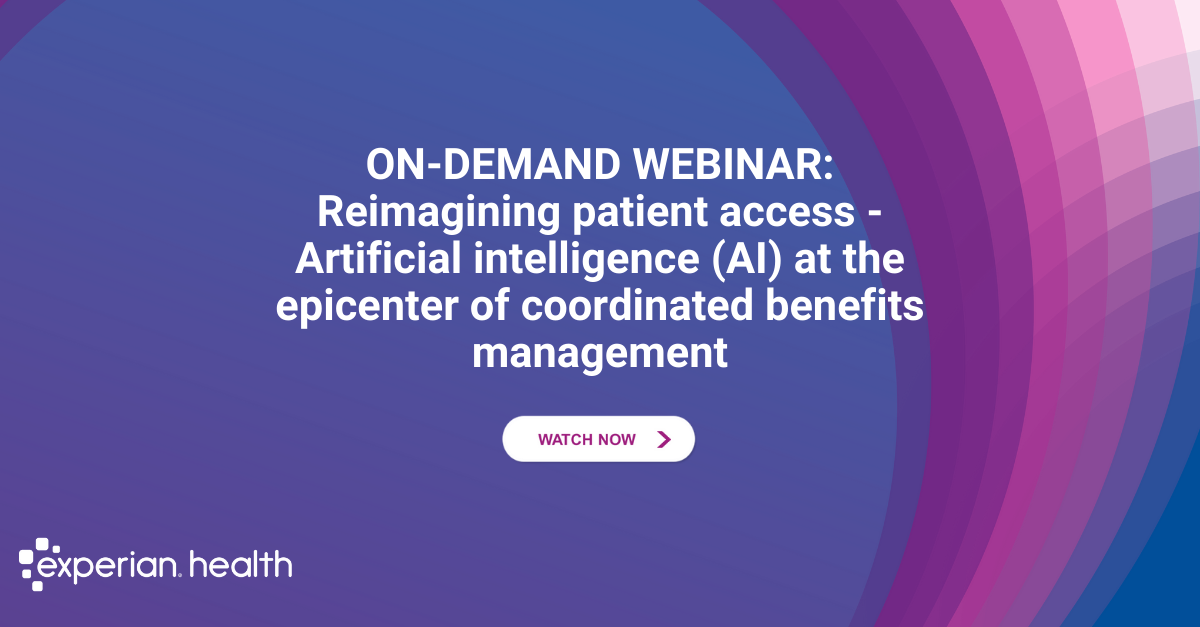At A Glance
Top reasons for healthcare claim denials include missing or inaccurate data, lack of prior authorizations, and incomplete patient registration. Discover how automation and artificial intelligence (AI) can help healthcare organizations overcome these roadblocks and break the denial cycle.
Key takeaways:
- The number one reason for medical claim denials remains unchanged in 2025, with missing or inaccurate claim data still topping the list — but worsening since 2024.
- AI-powered tools like Patient Access Curator™ and AI Advantage™ can help healthcare providers improve claim denial rates and optimize the claims management process.
- 67% of providers believe AI can improve the claims process, but only 14% report using AI to help reduce denials.
Experian Health’s State of Claims 2025 survey shows that a worrying trend in healthcare claim denials continues — and is worsening. More than 40% of providers report that at least one in ten claims are denied, an 11% uptick since 2022.
Denials at this scale are driven by numerous factors — many of which haven’t changed since 2024. This industry-wide, ongoing, and unchecked claims denial spiral represents billions of dollars in lost or delayed reimbursements, leaving revenue cycle leaders feeling mounting financial pressure to understand what’s behind the rising rates and address them before it’s too late.
This article explores the top reasons for claim denials, and how automation and AI can help organizations overcome operational roadblocks to reduce denial rates, streamline efficiencies and improve cash flow.
Top reasons for healthcare claim denials
Experian Health surveyed 250 healthcare revenue cycle leaders to find out what’s behind the rising claim denial rates. While the top drivers for denials remain the same in 2025 as 2024, the percentages have shifted slightly, with some providers reporting that things are getting worse, not better.
The top reasons for healthcare claim denials include missing or inaccurate claims data, authorizations, incomplete or incorrect patient registration data and code inaccuracy.
Missing or inaccurate claims data
In 2025, 50% of the State of Claims respondents report that missing or inaccurate claim data is the number one factor contributing to rising denial rates — up 4% from 2024. Clean claims submissions rely on getting the data right the first time. However, 54% of respondents say that claims errors are on the rise. And nearly 70% report that submitting clean claims is now more challenging than it was in 2024.
Inaccurate or incomplete patient data
Even the slightest mistake or mismatch in a patient’s name, address or insurance details can result in a denial, leading to payment delays and extra work for the staff. In 2025, more than a quarter of respondents say that at least 10% of denials result from inaccurate or incomplete data collected at patient intake. These errors often occur during registration, when critical patient information is first collected and entered.
Prior authorizations
Prior authorization issues continue to rank as a top operational challenge that triggers claim denials. Although slightly down from the previous year, 35% of survey respondents still identify authorizations as a primary trigger. Not only is the prior authorization process complex, but it’s also costly and time-consuming for many organizations to navigate successfully. According to the 2024 AMA Prior Authorization Physician Survey, physicians and their staff spend 13 hours per week completing prior authorizations – with nearly 90% reporting burnout.
Implementing technology to prevent claim denials
Leveraging technology-driven solutions can help organizations reduce claim denial rates, streamline operations and improve cash flow. Here’s a closer look at several strategies providers can adopt to help prevent claim denials and reduce costly reworks.
Tighten up patient access processes
Collecting accurate and complete data helps curb denials. Tools like Experian Health’s Patient Access Curator (PAC) allow providers to ensure accurate data is used at every step of the patient journey — with minimal manual intervention. Powered by AI and machine learning, PAC consolidates eligibility checks, coordination of benefits, Medicare Beneficiary Identifier (MBI) verification, demographics, insurance coverage and financial status into a single workflow.
With an integrated patient access solution in place, like Patient Access Curator, providers can quickly collect patient information upfront and eliminate the need to rerun eligibility checks. The result? Staff have more time for higher-value tasks, manual data entry errors decline and claim submissions are cleaner.
Modernize claims management
Legacy claims management processes are often tedious, disjointed and error-prone. Just over 80% of providers say their organization still relies on multiple solutions to collect information for claims submissions — many of which still require human intervention.
Tools such as Experian Health’s Claim Scrubber help providers prepare error-free claims for processing by reviewing each line of the claim before it’s submitted. For denials, a solution like Denial Workflow Manager enables organizations to track claim status and appeals in order to quickly prioritize claims that require follow-up.
Providers looking to modernize the entire claims cycle have the option to implement a solution that automates claims processing, like ClaimSource®, while current ClaimSource users can leverage AI Advantage to optimize the entire claims management process and better predict and prevent denials.
Lean into automation and AI
Revenue cycle leaders understand that AI has its benefits, with nearly 70% of providers saying they believe AI can improve the claims process. However, only 14% of organizations currently use AI to reduce denials. This shows that there may be some hesitancy around adopting new technology-based solutions.
For providers seeking to reduce denial rates and prevent future denials, leveraging technology, like AI, may provide a roadmap forward. Of the 14% who said their organization is currently using AI, 69% report that it has reduced claim denial rates and/or increased the success of resubmissions.
The future of claims management
As healthcare organizations continue to face narrow operating margins and increasingly complex payer requirements, the financial pressure of climbing claim denial rates is top of mind. Fortunately, AI-powered solutions and intelligent automation can help providers address top claims management challenges head-on. With AI-powered tools in place, like Experian Health’s Patient Access Curator and AI Advantage, healthcare organizations can minimize denial rates, while bolstering financial stability and improving patient experiences.
Learn how Experian Health’s AI-powered solutions, like Patient Access Curator and AI Advantage, can break the denial cycle for your organization.



